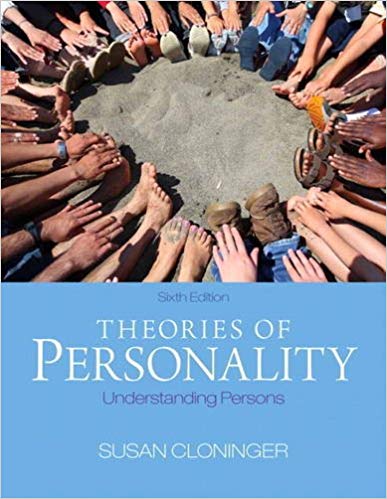Test Bank For Theories of Personality Understanding Persons 6th Edition By Susan C. Cloninger
Digital item No Waiting Time Instant DownloadISBN-13: 978-0205256242 ISBN-10: 0205256244
In Stock
Original price was: $55.00.$22.00Current price is: $22.00.
Test Bank For Theories of Personality Understanding Persons 6th Edition By Susan C. Cloninger
Theories of Personality, 6e (Cloninger)
Chapter 3
Multiple Choice
1) The fact that Martin Luther King, Jr. expressed himself within the Christian symbols of his own
heritage, rather than using symbols from other religious traditions,
A) would have been a disappointment to Jung.
B) was consistent with Jung’s advice that people stay within the symbols and mythology of their own
heritage.
C) was evidence that he had not developed to his full potential.
D) shows that he was prejudiced.
Answer: B
Difficulty: 2, p. 45
Question Type: Conceptual
2) According to the text, Dr. Martin Luther King, Jr., spoke in symbolic terms of the future potentials of
the world because he was
A) a minister.
B) an intuitive type.
C) black.
D) an extravert.
Answer: B
Difficulty: 2, p. 45
Question Type: Factual
3) Compared to Freud, Jung’s theory is
A) highly deterministic.
B) mystical.
C) less concerned with heredity.
D) more concerned with early childhood experience.
Answer: B
Difficulty: 2, p. 46
Question Type: Factual
4) What was Jung’s attitude toward scientific methods and language?
A) He praised scientific methods above literary methods.
B) He rejected science, saying it is unsuitable for understanding the psyche.
C) He accepted experimental science, but not survey methods.
D) He agreed with Freud’s opinion about science.
Answer: B
Difficulty: 2, p. 46
Question Type: Factual
5) When Jung and Freud first met
A) they argued, and decided they could not be colleagues.
B) they had much to talk about (13 hours worth!).
C) they planned to set up a joint therapy clinic.
D) Jung asked to be Freud’s patient.
Answer: B
Difficulty: 2, p. 47
Question Type: Factual
6) Jung’s term, “Self,” refers to
A) conscious self-concept.
B) how people are perceived by others.
C) the total, integrated personality.
D) unhealthy narcissism.
Answer: C
Difficulty: 3, p. 48
Question Type: Conceptual
7) Jung refers to the total, integrated personality as
A) the Self.
B) the persona.
C) the Great Mother.
D) the animus.
Answer: A
Difficulty: 2, p. 48
Question Type: Factual
8) According to Jung, the relationship between the conscious and unconscious aspects of personality is
best understood as
A) inflation.
B) conflict.
C) repression.
D) compensation.
Answer: D
Difficulty: 2, p. 48
Question Type: Conceptual
9) The adult developmental process in which various aspects of the unconscious are explored is called
A) individuation.
B) ego inflation.
C) teleology.
D) mysticism.
Answer: A
Difficulty: 2, pp. 48 – 49
Question Type: Factual
10) Individuation is the process of
A) finding a social identity.
B) finding the one individual who will be a life-long love partner.
C) re-centering in adult development.
D) discovering one’s major personality traits.
Answer: C
Difficulty: 3, pp. 48 – 49
Question Type: Factual
Test Bank for Theories of Personality: Understanding Persons, 6th Edition by Susan C. Cloninger
Overview: The Test Bank for Theories of Personality: Understanding Persons, 6th Edition by Susan C. Cloninger is a valuable resource designed to support students and educators in mastering the content of this comprehensive textbook. The test bank offers a wide range of questions to assess understanding of key concepts, theories, and applications related to personality psychology.
Content:
- Multiple Choice Questions: Includes questions covering major personality theories, their historical development, and key theorists such as Freud, Jung, Adler, Rogers, and others.
- True/False Questions: Assesses the student’s ability to distinguish between accurate and inaccurate statements regarding personality theories.
- Short Answer Questions: Focuses on the application of theoretical concepts to real-life scenarios and case studies.
- Essay Questions: Encourages deeper exploration and critical thinking about complex topics, including the evaluation of different personality theories and their implications.
- Case Studies: Provides practical examples for applying theoretical knowledge to specific cases, enhancing understanding of how personality theories can be used in various contexts.
Key Features:
- Comprehensive Coverage: Aligns with the textbook’s chapters, ensuring a thorough review of all key topics.
- Updated Content: Reflects the latest research and advancements in personality psychology as presented in the 6th edition.
- Practice and Preparation: Ideal for students preparing for exams or educators seeking to evaluate understanding and application of personality theories.
Conclusion:
The Test Bank for Theories of Personality: Understanding Persons, 6th Edition by Susan C. Cloninger is an essential tool for reinforcing knowledge and preparing for assessments in the study of personality psychology. It provides diverse question types to cover all aspects of the textbook and supports effective learning and teaching.


Reviews
There are no reviews yet.